
One of the things we have to watch out for in modern paganism is the tendency to project our attitudes into the past and then assume they would have been shared by ancient pagans. Many modern pagans and heathens will tell you they don’t “worship” or “serve” the gods, because they see that as a Christian attitude. Based on names like Giolla Bride and Mog Nuadat, it’s clear that some ancient pagans not only worshiped and served the gods they were devoted to, they were even willing to describe themselves as being the slave or servant of the deity.
When we hear those words, we imagine a degrading relationship in which the worshiper cringes before a tyrannical idol. However, this doesn’t fit the evidence very well. Mog Nuadat was a warlord who took on the legendary Conn of the Hundred Battles in combat. Mug Ruith was a feared and powerful druid. If these men were not ashamed to call themselves the slaves of their gods then there must be something more to this than meets the eye.
Names like this make much more sense if we look at them from the perspective of mysticism. It’s easy to understand why most people would find it degrading to describe yourself as the slave or servant of a spirit, however powerful. However, if we think of the gods as being not simply invisible people or powerful spirits, but the primal forces of the universe itself in personalized form, then it’s a different picture. Service to a god is different not just in quantity but in quality from service to a person. It doesn’t make your spirit smaller and weaker, but larger and more free.
Why? Because the divine is infinitely larger and more free than any limited human ego. When you describe yourself as a servant or a slave of the god, you’re saying that even if you happen to be the warrior king of Munster like Mog Nuadat, you can set aside your own ego and devote your entire being to the divine reality.
With your own narrow ego out of the way, you can become a conduit for the infinitely vast power of the godhood, so that as “Mog Lugos” or the Slave of Lugos you would also be “Lugovalos” or Strong in Lugos. You don’t become spiritually powerless by calling yourself the god’s slave — you become Power itself.
Ancient pagans devoted to warlike deities such as Nuada may have sought primarily to gain access to the power of the god so he could help them crush their enemies. When a modern devotee of Brighid takes on the position of the servant, she is devoting herself to the service of unconditional love, healing and creativity. In other words, intense devotion to Brighid can be thought of as a pagan equivalent of the “imitation of Christ” practiced by devout Christians. By living in the service of Brighid’s endlessly loving and creative power, the devotee can transcend the flaws and limitations of his individual psyche and become like the goddess.
Of course, we don’t really know how people thought about these names in ancient times. Names like these might have been given at birth — in which case the person bearing the name might not have ever given it much thought — or by a druid upon reaching adulthood, or they might have been chosen by the bearer of the name as a statement of personal devotion. We just don’t know, and we don’t really need to, because our spiritual possibilities are not limited to what people happened to do in ancient Gaul or Ireland. We can be inspired by these names to grow spiritually and develop deeper and more rewarding relationships with the divine, regardless of what the names originally signified.
In bhakti practice, there are several different “devotional moods” through which the worshiper may approach the deity. The moods most commonly mentioned are the Servant, Friend, Child, Parent, Spouse, and Lover moods. In the Servant mood, the deity is your master and you are the servant. This mood can be far more emotionally powerful than one would initially assume:
This mysterious task
Must be exactly
What you warned me about,
But it is not what I expected.
And yet I am lying here in Your fire,With no desire for other options.
I will shapeshift into
Whatever form You want me to
To understand my true nature:
I would be a wolf, a boar, a fish.My only wish:
Your lovely fingers on my harp-strings;
My every thought Your sweet music.
To be what You are always becoming
Is the sum total of my intention:
To become Your invention.
In the Friend mood, you and the deity are close personal friends. In the Child mood, you are the son or daughter of the deity, completely dependent on your divine mother or father. It is said that you can even make demands on the deity in this mood, just as a young child would make demands of his parents. In the Parent mood, the deity is your infant child who requires constant care and unconditional love. In the Spouse mood, you are married to the deity with an emphasis on sharing your lives completely the way spouses ideally do. In the Lover mood, your relationship to the deity is like being madly in love — although this mood is not considered appropriate for all deities or all devotees.
The Celtic names we’ve been examining, if considered as devotional moods, yield a very similar but not identical list to the moods of bhakti: Child (“Sucellogenos”), Friend (“Diocaros”), Strength (“Lugovalos”), Champion (“Netta Segamonas”), Hound (“Cunobelinus”), and Servant (“Giolla Bride”). We could also add “Spouse,” but not on the basis of naming customs. We’ll talk more about the “Spouse” relationship in Part 4.
Loop of Brighid is published on alternate Thursdays. Follow it via RSS or e-mail!













